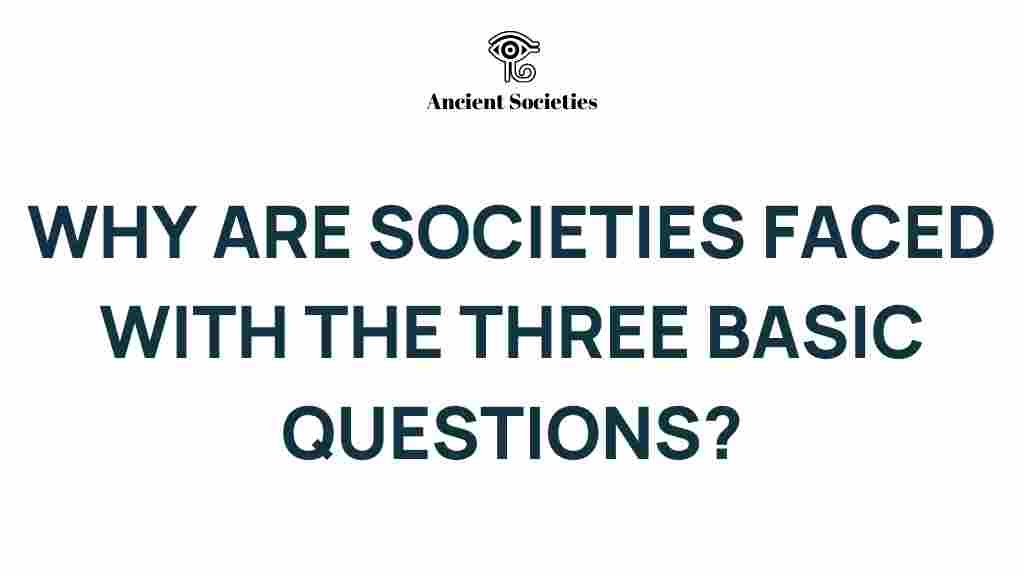Unraveling the Three Fundamental Questions That Shape Societies
Throughout history, societies have been shaped by a myriad of factors that influence their culture, governance, and social dynamics. Among these, three fundamental questions stand out as pivotal in understanding how communities form their identities, values, and decision-making processes. In this article, we will explore these questions and their implications for the structure and function of societies.
Understanding the Three Fundamental Questions
At the heart of every society lies three fundamental questions that dictate its progress and cohesion:
- **Who are we?**
- **What do we value?**
- **How do we make decisions?**
These questions are interconnected and influence each other, shaping the culture and history of societies. Let’s dive deeper into each of these fundamental questions.
1. Who Are We?
The question of identity is crucial for any society. It encompasses the shared history, culture, language, and traditions that bind individuals together. Understanding who we are involves examining:
- **Cultural Heritage:** The folklore, art, music, and traditions that define a community.
- **Historical Context:** The events that have shaped the society over time, including wars, migrations, and social movements.
- **Collective Memory:** How societies remember and interpret their past, which influences their current identity.
For example, Indigenous communities often draw on a rich tapestry of cultural heritage that informs their identity and societal structure. This history plays a vital role in their governance and social dynamics, as it lays the foundation for their values and decision-making processes.
2. What Do We Value?
Values serve as the moral compass of any society, guiding behavior and establishing norms. This question addresses what is deemed important within a community, including:
- **Ethical Beliefs:** Concepts of right and wrong that govern interpersonal relationships.
- **Social Justice:** The pursuit of equality and fairness in societal structures.
- **Economic Priorities:** How resources are allocated and what is considered worthwhile in economic terms.
For instance, societies that prioritize environmental sustainability often develop governance systems that reflect these values, impacting legislation and community practices. Understanding societal values can provide insights into conflicts and alliances within and between different communities.
3. How Do We Make Decisions?
Decision-making processes are crucial for the effective functioning of societies. This question explores the mechanisms through which choices are made, including:
- **Governance Structures:** The systems (democratic, autocratic, etc.) through which power is exercised.
- **Community Engagement:** How citizens participate in decision-making, from local councils to national elections.
- **Conflict Resolution:** The methods used to resolve disputes and disagreements within the community.
Effective decision-making is vital for the sustainability of societies. For example, a participatory governance model encourages community involvement, fostering a sense of belonging and identity among members. This, in turn, influences the values that are upheld within the society.
Interconnections Between the Questions
These three questions do not exist in isolation; they are deeply intertwined. A society’s identity influences its values, which in turn affect decision-making processes. For example:
- A society that identifies strongly with its cultural heritage may prioritize cultural preservation in its values.
- Communities that value inclusivity and equality are likely to adopt decision-making processes that reflect these principles.
- Historical experiences of conflict can shape a society’s identity, leading them to value peace and cooperation in governance.
Case Study: The Role of Identity in Contemporary Societies
To illustrate these concepts, let’s look at a contemporary example: the rise of social movements advocating for racial and gender equality. These movements often stem from a collective identity that has been shaped by historical injustices. They seek to redefine societal values by emphasizing inclusivity and diversity.
As these movements gain momentum, they influence decision-making at various levels, from local governance to national policies. This interplay illustrates how understanding the fundamental questions can lead to profound societal change.
Step-by-Step Process to Address These Questions in Society
To effectively engage with these fundamental questions in shaping societies, consider the following steps:
- Encourage Dialogue: Create platforms for open discussions about identity, values, and decision-making.
- Educate and Inform: Foster awareness of cultural heritage and historical contexts through education.
- Promote Inclusivity: Ensure diverse voices are represented in decision-making processes.
- Reflect on Values: Facilitate community reflection on shared values and ethics.
- Adapt Governance: Adjust governance structures to be more participatory and responsive to community needs.
Troubleshooting Tips for Societal Issues
When addressing the fundamental questions, societies may encounter challenges. Here are some troubleshooting tips:
- Lack of Engagement: Use social media and community events to encourage participation.
- Conflicting Values: Facilitate mediation sessions to find common ground among differing perspectives.
- Historical Disconnections: Organize workshops that connect historical events to present-day implications.
- Decision-Making Fatigue: Simplify processes and clarify roles to avoid overwhelming community members.
Conclusion
In conclusion, unraveling the three fundamental questions—who are we, what do we value, and how do we make decisions—is essential for understanding and shaping societies. These questions not only define cultural and historical contexts but also influence governance and social dynamics. By actively engaging with these questions, communities can foster a strong sense of identity and shared values, leading to effective decision-making and a cohesive society.
For further reading on the impact of culture and history on social dynamics, visit this resource. To explore more about community engagement strategies, check out this guide.
This article is in the category Society and created by AncientSocieties Team
